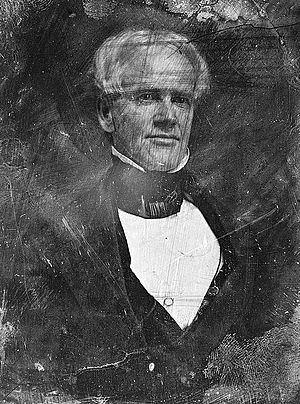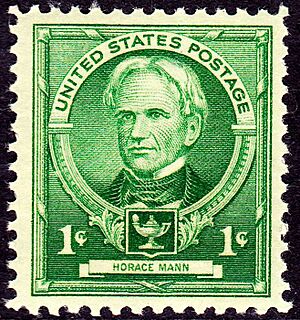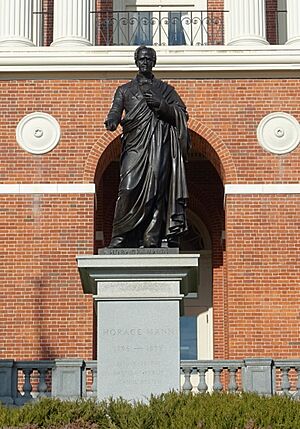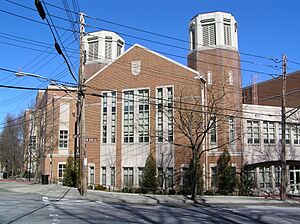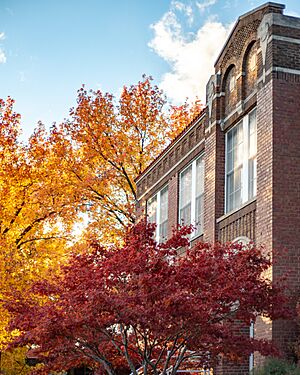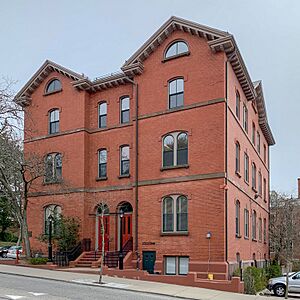Horace Mann facts for kids
Quick facts for kids
Horace Mann
|
|
|---|---|
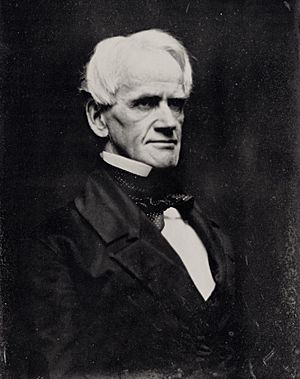 |
|
| Member of the U.S. House of Representatives from Massachusetts's 8th district |
|
| In office April 3, 1848 – March 3, 1853 |
|
| Preceded by | John Quincy Adams |
| Succeeded by | Tappan Wentworth |
| Personal details | |
| Born | May 4, 1796 Franklin, Massachusetts, U.S. |
| Died | August 2, 1859 (aged 63) Yellow Springs, Ohio, U.S. |
| Resting place | North Burial Ground, Providence, Rhode Island, U.S. |
| Political party | Whig |
| Spouses | Charlotte Messer Mann (d. 1832) Mary Peabody Mann |
| Children | 3 |
| Alma mater | Brown University Litchfield Law School |
| Occupation | Lawyer Educator College president |
| Signature | |
Horace Mann (born May 4, 1796 – died August 2, 1859) was an important American leader. He worked to make schools better for everyone. He was also against slavery and was a Whig politician. He is often called the "Father of American Public Education."
Contents
Early Life and Learning
Horace Mann was born in Franklin, Massachusetts. His family didn't have a lot of money. When he was young, he only went to school for about six weeks each year. But he loved to learn! He used the Franklin Public Library, which was the very first public library in America.
When he was 20, he started studying at Brown University. He finished his degree in just three years. He was the best student in his class in 1819.
After college, he studied law. He also taught Latin and Greek at Brown University. In 1823, he became a lawyer in Dedham, Massachusetts.
Horace Mann's Career in Government
Horace Mann was elected to the Massachusetts state government in 1827. He cared a lot about education and helping people in need. He also worked on laws to stop alcohol sales and lotteries.
He helped create a hospital for people with mental health issues in Worcester. He led the group that managed this hospital starting in 1833.
Mann moved to Boston in 1833. He was elected to the Massachusetts State Senate in 1835. He even became the president of the Senate from 1836 to 1837. In this role, he helped get money for building railroads and canals.
Later, in 1848, Mann was elected to the United States House of Representatives. He served there until 1853.
From 1852 until he died, he was the president of Antioch College. He taught subjects like economics and philosophy. Students and people in the Midwest liked his lectures about public schools.
Making Schools Better for Everyone
Horace Mann became the Secretary of the new Massachusetts Board of Education in 1837. This was when he started his most important work: changing education in America. He stopped all his other jobs to focus only on schools.
As Secretary of Education, Mann did many things to improve schools:
- He held meetings for teachers to share new ideas.
- He gave many speeches about the importance of education.
- He wrote many letters to spread his ideas.
- He introduced many new ways to teach and learn.
He believed that women were great teachers. He encouraged more women to become teachers. He also started special schools called "normal schools" to train teachers. These schools gave women new job chances.
Mann also pushed for public schools to be paid for by taxes. This meant that all children, no matter how rich or poor, could go to school. He was also against hitting students as punishment. He even visited every school in Massachusetts to see how they were doing!
In 1838, he started a newspaper called The Common School Journal. In this paper, he wrote about problems in public schools and how to fix them. He had six main ideas for public education:
- Everyone should be educated.
- Public education should be paid for and managed by the public.
- Schools should welcome children from all backgrounds.
- Education should not be tied to any one religion.
- Teaching should follow the ideas of a free society.
- Teachers should be well-trained professionals.
In 1843, he traveled to Europe to visit schools, especially in Prussia. He wrote a report about what he learned there.
Mann hoped that if all children learned together, they would have a common experience. This would also help children from poorer families succeed. He believed that schools should help build a person's character, not just teach reading, writing, and math. He also thought that schools should be separate from churches.
Horace Mann's work changed the public school system in Massachusetts. His ideas then spread and influenced schools in other states across America.
Fighting Against Slavery
In 1848, Horace Mann was elected to the United States Congress. He took the place of John Quincy Adams, who had passed away. As a member of Congress, Mann was a strong opponent of slavery.
Horace Mann's Family Life
In 1830, Horace Mann married Charlotte Messer. She was the daughter of the president of Brown University. Sadly, she died two years later in 1832. He was very sad after her death.
In 1843, he married Mary Tyler Peabody. They had three sons: Horace Mann Jr., George Combe Mann, and Benjamin Pickman Mann.
Death
Horace Mann died in 1859 from typhoid fever. He is buried in the North Burial Ground in Providence, Rhode Island. He rests next to his first wife, Charlotte.
Interesting Facts About Horace Mann
- Many U.S. states used ideas from the school system Mann created in Massachusetts. This included training professional teachers in "normal schools."
- Historians say Horace Mann, along with Henry Barnard and Catherine Beecher, were key leaders of the Common School Movement. This movement worked to create public schools for all children.
- As president of Antioch College, Mann hired the first female teacher who was paid the same as male teachers. Her name was Rebecca Pennell, and she was his niece.
Famous Words from Horace Mann
- “A house without books is like a room without windows.”
- “Doing nothing for others is the undoing of ourselves.”
- “Seek not greatness, but seek truth and you will find both.”
Honoring Horace Mann
Many places are named after Horace Mann. More than 50 public schools in the United States carry his name.
A statue of Horace Mann stands in front of the Massachusetts State House in Boston.
At Antioch College, there is a monument with his famous quote: "Be Ashamed to Die Until You Have Won Some Victory for Humanity." This quote is now the college's motto.
The University of Northern Colorado named the gates to its campus after him.
The Horace Mann Educators Corporation, an insurance company, was renamed in his honor in 1950.
Pittsburg State University in Pittsburg, Kansas, has a building called Horace Mann School.
Schools Named After Horace Mann
Many schools across the U.S. are named after Horace Mann to honor his work in education. Here are just a few examples:
- Horace Mann Elementary School in Anaheim, California
- Horace Mann Elementary School in Bayonne, New Jersey
- Horace Mann Elementary School in Glendale, California
- Horace Mann Junior High School in Los Angeles
- Horace Mann Elementary School in Newton, Massachusetts
- Horace Mann Middle School in Franklin, Massachusetts
- Horace Mann School in Bronx, New York
- Horace Mann School for the Deaf and Hard of Hearing in Allston, Massachusetts
College Buildings Named After Horace Mann
Several college buildings are also named after him:
- Horace Mann Auditorium at Bridgewater State University
- Horace Mann Hall at Teachers College, Columbia University
- Horace Mann House at Brown University, his old college.
See also
 In Spanish: Horace Mann Sr. para niños
In Spanish: Horace Mann Sr. para niños
 | Sharif Bey |
 | Hale Woodruff |
 | Richmond Barthé |
 | Purvis Young |


